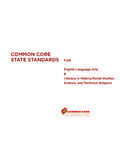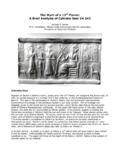Transcription of Analysis of - English Scholar
1 Analysis of A Letter from a Birmingham Jail by Dr. Martin Luther King, Jr. By Stacey Kramer From the very beginning, King establishes himself within his audiences group so he is not seen as an outsider but as someone they can trust. In the heading, he addresses his audience as My Dear Fellow Clergymen: King uses this similarity between him and his audience throughout the letter, and he contrasts this camaraderie with his disdain for and disappointment toward his fellows and their inaction. For example, in the third paragraph, he compares himself to the apostle Paul and Christian prophets, simultaneously implying that he is not only as holy as these people, but that he is as knowledgeable about the gospel and its history as his fellow clergymen. In the last sentence of paragraph twelve, King quotes St. Augustine, further exemplifying his knowledge of the church, while also mentioning a figure who valued freedom and the sanctity of the church.
2 In the next paragraph he references St. Aquinas as well. Later he justifies civil disobedience with a reference to a biblical story, where the people being punished for such were protected from death by God, in paragraph seventeen. Also in that paragraph, he used pathos as well as ethos: It was practiced superbly by the early Christians, who were willing to face hungry lions and the excruciating pain of chopping blocks rather than submit to certain unjust laws of the Roman Empire. The adjectives he uses emphasize this sacrifice and beg the question towards the clergymen whether they would be willing to do the same. In paragraph ten, he writes: My friends, I must say to This is as if he is their long-time friend who must admit something, though it is difficult, because he is their friend, and friends deserve honesty. He uses this honesty again in the second sentence of paragraph eleven, by stating the word frankly , and once more in the beginning of paragraph nineteen, by writing: I must make two honest confessions to you, my Christian and Jewish brothers.
3 This honesty towards his brothers may cushion the blow as he criticizes the church s inaction. In the thirteenth paragraph he states: Paul Tillich has said that sin is separation. Is not segregation an existential expression of man s tragic separation, his awful estrangement, his terrible sinfulness? He appeals to ethos by mentioning Paul Tillich, a theologian who tried to mesh Christianity with other philosophical and societal problems. King then creates an emotional appeal by using the words tragic, awful, and terrible. He also implies that the clergymen are not doing their job, which is to help humanity through faith. He is almost combative with the clergymen in the paragraph twenty-two, when he states: You speak of our activity in Birmingham as extreme. This you is very direct and accusatory. It is accentuated by his almost parent-chastising-a-child tone in the next sentence: At first I was rather disappointed that fellow clergymen would see my nonviolent efforts as those of an extremist.
4 He held higher standards for his fellow clergymen, expecting them not to fall into the habit of conformity. Paragraph twenty-six repeats these techniques: But despite these notable exceptions, I must honestly reiterate that I have been disappointed with the church. I do not say this as one of those negative critics who can always find something wrong with the church. I say this as a minister of the gospel, who loves the church; who was nurtured in its bosom; who has been sustained by its spiritual blessings and who will remain true to it as long as the cord of life shall lengthen. This appeals to ethos by reiterating his knowledge of the gospel and his fondness for it; because of his fondness for the church he shows his concern is genuine and heartfelt. He also uses his description of his love of the church to appeal to pathos. He uses diction to suggest a deep love that is betrayed by its change towards what he sees as the wrong direction.
5 In paragraph thirty-one he combines his use of pathos and ethos: Yes, I love the church. How could I do otherwise? I am in the rather unique position of being the son, the grandson and the great grandson of preachers. Yes, I see the church as the body of Christ. But, oh! How we have blemished and scarred that body through social neglect and through fear of being nonconformists. He appeals to ethos by citing his heritage of preachers, implying that he is deeply involved with the church. He appeals to pathos again by his declaration of love. When he states: How could I otherwise? This short sentence sounds reminiscent of lovers replies to the question How could you love him/her? This implied helplessness is a mark of true love. He shows how he suffers because of his love, as well, with his exclamation of: But oh! This short sentence emphasizes the sharp pain King feels at the church s state.
6 He uses powerful words such as blemished and scarred to give this state a physical form. This emphasizes the strong role reversal suggested here by King s labeling the clergymen as the ones persecuting Jesus in the form of the church, rather than those worshipping him. It also alludes to the idea that the church that is wrong now may be resurrected as Jesus was. In the last paragraph of his letter he reminds the clergymen once again of their common thread by saying that he would want to meet them: ..not as an integrationist or a civil-rights leader but as a fellow clergyman and a Christian brother. He attacks the clergymen s inaction by showing how unchristian it is to ignore the segregation King faces from a daily basis. Paragraph thirty-two was where King attacked the clergymen by questioning their faith and commitment: There was a time when the church was very powerful in the time when the early Christians rejoiced at being deemed worthy to suffer for what they believed.
7 In those days the church was not merely a thermometer that recorded the ideas and principles of popular opinion; it was a thermostat that transformed the mores of society. King is stating here that the church is no longer powerful because it is influenced rather than influences. He implies that the clergymen are almost squeamish, and too selfish, to go with what they believed. His metaphor here is a simple and practical comparison, as he uses items that are common and not idealized. King wants the church to be relevant to the real world and to be of practical use, like a thermostat. In his third to last paragraph, he states: I can assure you that it [the letter] would have been much shorter if I had been writing from a comfortable desk, but what else can one do when he is alone in a narrow jail cell, other than write long letters, think long thoughts and pray long prayers? He implies that the clergymen, writing their statements sitting at comfortable desks, do not compare to King, who is suffering for a worthy cause in a courageous way.
8 He appeals to pathos by drawing out his sentence and restating the word long . His last paragraph even goes so far to imply the clergymen are not devout Christians: I hope this letter finds you strong in the faith. Here King doubts that the clergymen would be strong in the faith, an absolute entity that cannot be changed, which King believes is the basis for his actions against segregation. This faith is the true church, which the clergymen, through inaction and dehumanization of Christianity, ignore for the sake of law and order. King again uses pathos after demoting the clergymen, by stating in the second sentence: I also hope that circumstances will soon make it possible for me to meet each of reminding the clergymen that King is in jail. This also appeals to ethos, as King is acting gentlemanly enough to want to meet the men he is trying to debunk. King also reminds the clergymen of their common background.
9 They are all from the United States and all based in the south. He appeals to logos in paragraph four when he states: Never again can we afford to live with the narrow, provincial outside agitator idea. Anyone who lives inside the United States can never be considered and outsider within its bounds. Never again refers to the Civil War, when the South believed that the North was interfering with its affairs and so split from the United States. Referencing this time frame also brings back memories of slavery and the elimination of it. The second sentence is simply stated and is written very confidently, creating both an appeal to ethos and logos. In the last sentence of paragraph nine, King describes the South as ..our beloved , clearly an appeal to pathos, which would be very effective among the all-Southern clergymen who most likely value the South as an entity almost as much as those during the Civil War did.
10 In paragraph eleven, King writes more patriotically: We must come to see, with one of our distinguished jurists, that justice too long delayed is justice denied. This quote reminds the audience of the values that the United States is based upon. Hopefully, this will lead the clergymen to apply this not only to criminal prosecution but also segregation. Paragraph twelve is where King compares other nations to the United States: The nations of Asia and Africa are moving with jetlike speed toward gaining political independence, but we still creep at horse and buggy pace toward gaining a cup of coffee at a lunch counter. This race with other countries invokes patriotism, and a competitive spirit that desires to improve more quickly than, what is implied as, inferior countries. King is also appealing to logos by making this seem like such an obvious blunder on the clergymen and the United States part that King must be right and they should improve their nation like the other countries have sense to do.





